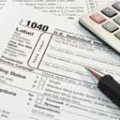Now that tax season has officially ended, it’s time to plan ahead for next year so you aren’t scrambling to get everything done at the last minute. Even though you may be tempted to wait to start thinking about next year’s taxes, it’s best to consider this a year-round obligation. This way, you may be able to save much more money in 2017 and beyond. Here are six tax tips from the experts to help you spend less time in frustration when filing.
1. Keep Everything Organized
One of the most important tips to make tax filings a breeze is to keep everything organized. If you plan to itemize your deductions, you’ll need to accurately track your spending and keep your receipts and documentation. Even if you have no interest in itemizing, it’s best to keep all of your tax forms together in one spot so you can easily find all materials once it’s time to file.
2. Review Your Withholdings
Before you get frustrated with next year’s tax forms, make sure your paycheck is properly set up for the right kind of payroll withholdings. Whenever you start a new job, it’s up to you to fill out your tax form paperwork so your employer withholds the correct amount. You can claim exemptions based on the number of dependents you have in your household. Some workers keep their withholdings the same for decades, never realizing they could get more money in their paycheck every two weeks if they adjust for their current lifestyle.
3. Use Technology
Technology is another key tool in keeping your taxes and other financial details organized. Most experts recommend that consumers invest in some sort of budgeting software to help them reach their financial goals. This way you can track your spending on things such as your home, children, food, and other expenses. Over time you can see trends and develop a better plan to save more money and spend less on taxes.
4. Get a Professional Consultation
It’s also helpful to get a professional’s advice at some point before the April 15th deadline. Many consumers only talk to their accountant or other financial professional right at tax time, but it’s a better idea to have a working relationship with someone well versed in finance or accounting throughout the year. If you’re not sure how to find someone who has the right knowledge and skills, it’s best to seek someone with top academic credentials, like an advanced degree in accounting from a program such as Maryville University for example.
5. Learn About Tax Breaks
If you want to minimize your taxes, you’ve also got to know more than the average consumer about tax breaks. There are plenty of opportunities you can take advantage of to help lower your tax bill each year and gain more income in your pocket. Some consumers are able to save on their tax bill by using products such as retirement accounts, health savings accounts, and other investments just to name a few.
6. Start Filing Early
Most of all, it’s essential to file your taxes as early as possible. Employers usually send out tax forms to their workers in January, which means you can get a head start on your tax filing around that time. Whether you file on your own with electronic software, or you get the assistance of a tax professional, it’s much less stressful to get started in January or February than to wait until the second week of April to begin. This way, if you encounter any problems, it’s much easier to get them resolved without missing the deadline.
Final Thoughts
It’s important to use whatever resources are available to help smooth the process of your taxes each year. Doing so could help make filing much easier and faster for the future and give you one less thing to worry about.








